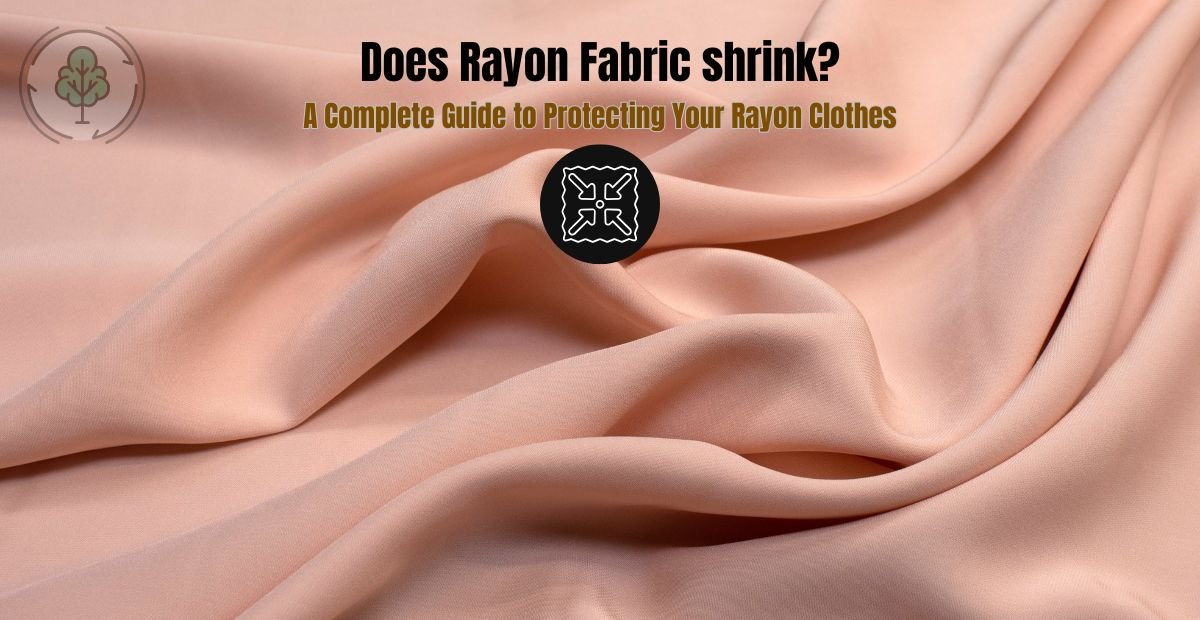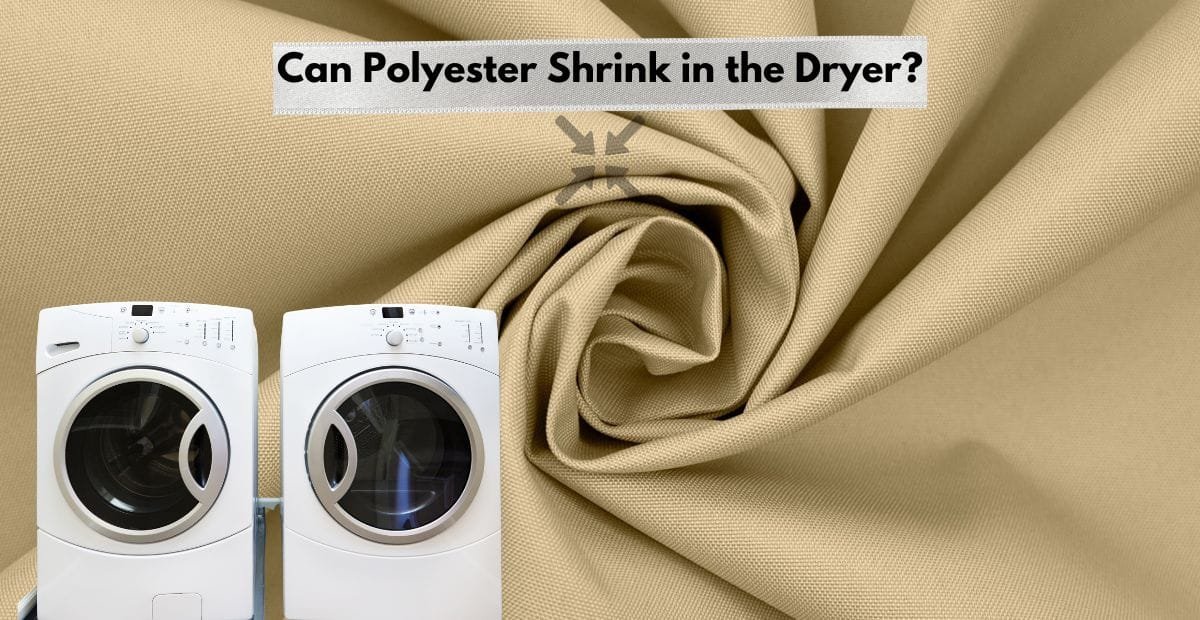Introduction-
Does rayon shrink? This question has a short answer, and that answer happens to be yes, but it depends on the circumstance. This concern seems to be the most widespread for both purchaser and user. The fabric rayon has an impressive, luxurious appearance, feels like a soft cloud and drapes quite elegantly. The thinness of rayons construction does, however, make many people more tentative. The questions we will be tackling in this article is, when does rayon shrink, why does it shrink and what can be done to prevent it, and keeping your clothing looking sharp and fashionable?
Understanding Rayon Fabric
Rayon: A Semi-Synthetic Cellulose Fiber
Rayon is a synthetic-semi synthetic fiber produced as a result of a chemical treatment of wood pulp. It creates a fine soft, cotton-like fabric and a good drape. Indeed, according to one of the guides, rayon is produced using the plant cellulose and is soft and natural like cotton. But this processing compromises the fiber structure. Contextually, a rayon incorporates such varieties as viscose and modal, which are somewhat different yet all require a delicate care. Consequently, rayon is vulnerable compared to pure cotton or polyester.
Fiber Structure vs. Cotton and Polyester
Rayon does not possess such good molecular bonds as cotton or synthetic fibers. Actually, the amount of water rayon can absorb is much more than that of cotton and it swells considerably when wet. This additional moisture leads to further shrinkage of rayon but cotton or polyester fabrics do not change their shape. Polyester, as an example, practically does not shrink.
Delicate Weave and Construction
In addition, most rayon fabrics are loosely knitted or weaved. These fabrics can swing freely when wet with the threads. Fibers in a loosely woven rayon garment are able to stretch and contract when the garment dries, becoming shorter in length and therefore, shrinking. Even the most gentle washing may result in the slight loss of size in the course of time.
Does Rayon Shrink?
- High Heat: Rayon will be seriously shrank in hot wash or in dryer with high temperature. Rayon has delicate fiber bonds that are broken by heat causing them to tighten.
- Moisture & Agitation: Rayon fibers swell in wetness. When a wet garment made of rayon is stirred up (spun or tumbled) the fibers draw and shorten when drying.
- Mechanical Stress: Rayon is also spoiled by vigorous washing or spinning. Sharp agitation or rapid cycles disintegrate the fibers resulting in further shrinkage and at times distortion.
- Cumulative Shrinkage: Rayon can keep on shrinking steadily when it is washed over and over again in an unsuitable manner. Further shrinkage is greatly slowed down by proper maintenance using cold washes.
How Much Can Rayon Shrink?
Rayon garments under normal circumstances shrink between 5 – 10% on washing. In severe instances (as hot-water washes) the shrinkage is up to about 20%. The precise cost depends upon the type of fiber, type of fabric construction, and pre- treatment. During manufacture, manufacturers tend to maintain the shrinkage of rayon at less than 8%.
Why Does Rayon Shrink?

Unstable Cellulose Structure
Rayon is a chemically treated cellulose fiber that is regenerated. This treatment leaves its internal bonds weak and thus the fiber is inherently unstable. Consequently, rayon does not have the elasticity to maintain its original size when under stress.
Weakness When Wet
Besides, the fibers of rayon become weak after they become wet. The fibers swell and lack the strength to go back to shape. Any action or stress on wet rayon leads to re-formed fibers in a tighter and shrunken form.
Sensitivity to Heat
Moreover, rayon fibers are also made weak by high temperatures. When hot water or direct heat is applied the fibers tighten. Being a low thermal stability fabric, even a high heat iron will draw in the fabric and lead to shrinkage.
Blends vs. Pure Rayon
Rayon (such as viscose) is particularly susceptible to shrinkage when it is of pure form. Adding rayon to long lasting synthetics (polyester, spandex) greatly minimizes shrinkage. That is, a rayon-poly blend will not shorten significantly compared to 100% rayon, and rayon-cotton or rayon-linen blends still will shorten.
When is Rayon Most Likely to Shrink?
Machine Washing
As an example, when you are not careful when handling rayon a washing machine can shrink it. The spinning cycle and agitator subject the fibers to stress. Always follow a cold water and mesh laundry bag cycle therefore, to ensure a minimum amount of stress.
Hot Water
A hot wash water is especially dangerous. It makes the rayon fibers swell up vastly. The next thing to do is to ensure that the rayon is washed in cold water as this will prevent the shrinkage that occurs when it is washed using warm or hot water.
Machine Drying
Rayon will certainly be shortened in the tumble dryers. The heat and tumbling down diminish the fibers. Never use a dryer, but leave rayon to air-dry in order to retain its size.

Ironing at High Temperatures
Rayon can also be shrunk in direct ironing. The fibers will be tightened with a high temperature variant of the iron, so it is better to use a low heat level. It is safer to steam or iron inside-out because it will not bring the fabric smaller.
Dry Cleaning (Safer Option)
Dry cleaning involves the use of solvents as opposed to water, which does not alter the dimensions of rayon. Dry cleaning is usually the solution to prevent any form of shrinkage in case it is recommended in the care label.
How to Wash Rayon Without Shrinking

Hand Wash vs. Machine Wash
The safest way is hand washing. Swirl rayon in sink of cool water with mild detergent. When you are required to use a machine you should always choose a light cycle and place the piece(garment) in a mesh bag. Do not twist or wring rayon, squeeze out water or pat dry the cloth.
Cold Water Washing
Always cold water in the washing of rayon. The fibers are expanded substantially less by cold water. This makes the possibility of shrinkage very minimal as compared to warm or hot water.
Gentle Detergent
Use a mild, neutral detergent. Strong enzymes and bleach will destroy rayon fiber or strip finishes, so check out harsh chemicals. Delicate soaps do not destroy the fabric.
Turn Garments Inside Out
Before washing cloths made of rayon, it is better to turn the clothes inside-out to protect the surface fibers. It lowers friction and aids in preserving any prints or finishes on the outer side of the item of clothing.
How to Dry Rayon Without Shrinking
Air Dry Flat vs. Hanging
Rayon is better dried by simply laying it on a towel. This helps in avoiding the stretching and maintaining shape of the garment. Wet rayon can fall and give it an out-of-shape shape.
Avoid Tumble Dryers
Do not machine-dry rayon. Shrinking can even occur with low-heat tumble drying. The size of the garment is much safer when air-dried on a rack or flat surface.
Reshape After Washing
When it is wet, reshape the rayon after washing, but being careful not to dry it out. Iron to remove wrinkles and stretch the fabric to its size. Pin or weigh down the sides so that it dries in the right shape.
Can You Unshrink Rayon?
- Preparation: Add hair conditioner (1 tbsp) to lukewarm water and mix. The contracted rayon has to be left to relax the fibers, and this is done by immersing the rayon 10-15 minutes.
- Wipe out water: Take out the product and roll it in towel. This does not wring out extra moisture.
- Stretch back: Place the damp rayon in a clean surface. Slowly re-stretch towards the required dimensions.
- Safe and dry: Seal the edges with heavy objects or pins in order to keep the cloth in place. Allow it to dry flat on the air. (Note: this technique is most effective immediately after the shrinkage and might not be able to restore the size of the item completely).
Does Rayon Shrink Every Time You Wash It?
First Wash vs Repeat Wash
Rayon tends to shrink during the first wash. Once you have washed it, additional changes in size should be minor provided you take adequate care.
Pre-Shrunk Rayon vs. Un-treated Rayon
There are rayon fabrics that are pre-shrunk or stabilized in the factory. Rayon that has not been treated will reduce more during washing.
Importance of Care Labels
Always use the instructions on care label. The label informs you of the most safe way of cleaning (hand wash, dry clean, etc.). Ignoring it is the quickest way to cause unwanted shrinkage.
Rayon vs Other Fabrics: Shrinkage Comparison
| Fabric | Typical Shrinkage (%) |
|---|---|
| Rayon | ~5–10% (up to ~20% in extreme cases) |
| Cotton | ~6–8% |
| Polyester | ~0–3% |
| Linen | ~<5% |
Rayon vs. Cotton
Due to the weaker fiber structure, rayon tends to shrink compared to cotton. Cotton fibers are stronger and more resilient by their nature, thus they retain their shape even after washing. Although cotton may shrink, it normally occurs once and thereafter stabilizes. Rayon, however, is not so stable and thus is more prone to changing of sizes with repeated washes.
Rayon vs. Polyester
Polyester does not shrink much as compared to rayon hence it is far much more maintenance free. A garment made of polyester will not tend to change its size when it is subjected to heat, water or agitation. However, when the same is done with rayon, it loses shape as soon as possible. This renders polyester to be the choice in terms of durability but rayon is soft and takes delicate attention.
Rayon vs. Linen
Linen which is also produced using flax fibers shrinks but not as badly as rayon. Linen clothes contract only by a little percentage, usually not more than 5%. Rayons on the other hand usually shrink up to 5-10% when washed ineptly and in some cases even higher. The two types of fabrics are breathable and comfortable but require light handling to ensure that they do not suffer permanent damage or lose their shape.
How to Prevent Rayon Shrinkage: Practical Tips

- Look at the Care Label: You should always examine the instructions on the garment. The manufacturer is in the best position to know how to clean the fabric.
- Wash Cold and Gentle: Cold and gentle machine cycle. Low agitation and cold water are to prevent shrinkage.
- Pass on the Dryer: Do not tumble- dry rayon. It should be air-dried in order to maintain its size.
- Wear Laundry Bags: Have rayon garments washed in a mesh garment bag. This makes the cloth resistant to coarse movement.
- Select Rayon Blends: Select rayon blended with polyester or spandex where possible. Such combinations are far less susceptible to shrinking.
- Reduce Washing: Wash rayon only when it is needed. Excessive washing may destroy the garment material and cause shrinkage in the long run.
- Handle Gently: Rayon should not be wringed or twisted. Gently treat it like silk or wool so as not to lose its form.
Conclusion-
Rayon, in most instances, is easily shrunk, nevertheless, most of it can be avoided by treating it as a fragile garment. Conclusion: cold water wash, low cycles and low heat. Just follow what the label on the package indicates to do and dry rayon in a flat position. All the tips above are aimed to be respectful to rayon and eliminate the unexpected shrinkage. After all, a small additional care would be enough. To achieve optimal outcomes, rayon should be handled like a fragile material such as wool or silk because light treatment is rewarded.
Read More>> About what is Rayon Fabric?
FAQs
Does rayon shrink in cold water?
Yes, but very little. Cold water washing has a minimal shrinkage relative to hot water hence it is a safer option.
Does rayon shrink in the dryer?
Yes. Rayon will be contracted by high heat and tumbling. Rayon should always be air-dried when you want to keep it in size.
Does rayon shrink more than cotton?
Yes. The fibers of rayon are less stable than the fibers of cotton and therefore when the same conditions are taken, rayon will shrink more. Wash rayon with less strength than cotton.
Is rayon always “dry clean only”?
Not always. There are rayon mixtures which are soft to hand-wash. Nevertheless, when the label on the claim reads dry clean then it is advisable to do so.
Can rayon clothes last long if cared properly?
Yes. Rayon clothes can go through numerous seasons with proper handling and proper laundry procedures. Washing and drying will ensure that the fabric is not damaged.



